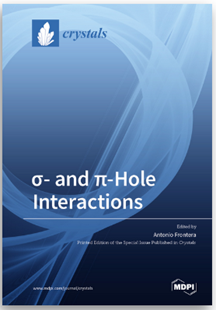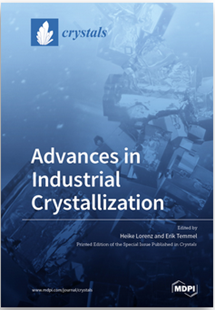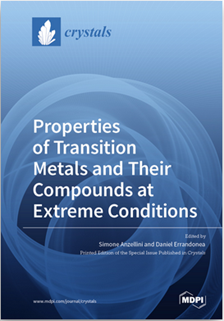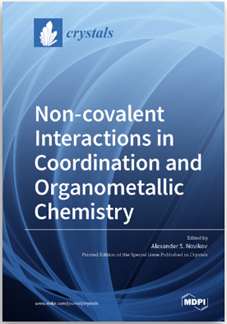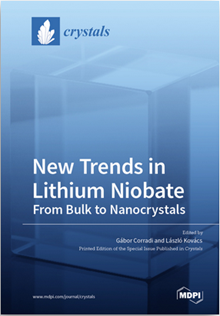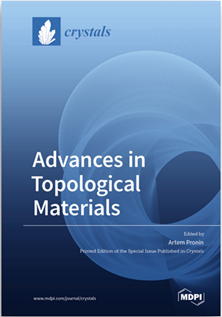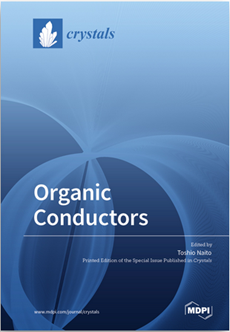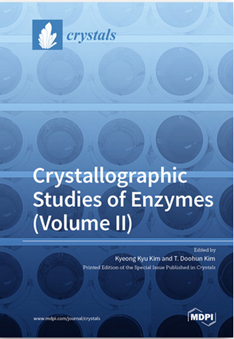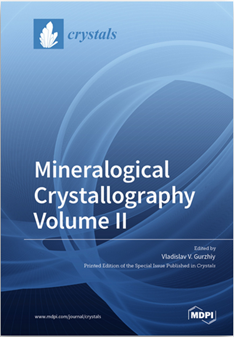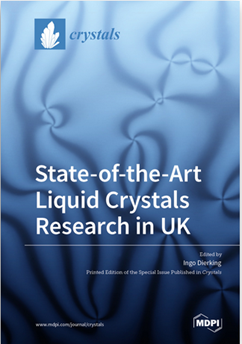
Journal Menu
► ▼ Journal Menu-
- Crystals Home
- Aims & Scope
- Editorial Board
- Reviewer Board
- Topical Advisory Panel
- Instructions for Authors
- Special Issues
- Topics
- Sections & Collections
- Article Processing Charge
- Indexing & Archiving
- Editor’s Choice Articles
- Most Cited & Viewed
- Journal Statistics
- Journal History
- Journal Awards
- Society Collaborations
- Conferences
- Editorial Office
Journal Browser
► ▼ Journal BrowserNeed Help?
Announcements
7 March 2023
Displaying Co-Authors’ Email Addresses on the Webpage of Published Papers
MDPI is pleased to announce that we now display the co-authors’ email addresses in addition to the corresponding author’s email address on the webpage of published papers, protected by Captcha. For more information about this change, please visit the journal’s instructions for authors page.
We believe this change will facilitate academic discussions and advance our cause of open science and research. The corresponding authors are responsible for communicating with their co-authors and indicating in our system (https://susy.mdpi.com/) if co-authors would prefer for their email addresses not to be displayed.
16 February 2023
Increasing Visibility for Preprints.org – Clarivate adds the Preprint Citation Index to the Web of Science

On 9 February 2023, Clarivate, a global leader in providing trusted insights and analytics, added the Preprint Citation Index to the Web of Science platform, streamlining the research process by allowing researchers to locate and link to preprints alongside other trusted content in the database.
The Preprint Citation Index will act as a bridge to connect cutting-edge preprints with peer-reviewed journal articles published within the Web of Science Core Collection. Alerts can be easily set to monitor new research across several repositories and authors will also be able to include preprints on their Web of Science Research Profile to more accurately display their various research outputs.
As of its launch, the Preprint Citation Index will provide nearly two million preprints from various repositories, including MDPI’s own Preprints.org.
MDPI's Preprints Platform – Preprints.org
To advance Open Science and the fast dissemination of research, MDPI offers researchers a free multidisciplinary preprint platform. Preprints.org accepts submissions from all research areas and offers authors high visibility, permanent archiving, article-level Metrics and immediately citable content by assigning a Digital Object Identifier (DOI) to all preprints.
During submission to any MDPI journal, authors have the option to share their research as a preprint. After an initial screening, the manuscript is available online in 48 hours or less. Once online, preprints can be downloaded, shared, commented on, and cited, providing authors maximum visibility.
We invite you to join the ranks of the over 100k researchers using Preprints.org and share your research.
For more information, please visit Preprints.org.
9 February 2023
Meet Us at the Fourth International Conference on Energy Storage Materials, 13–16 April 2023, Shenzhen, China
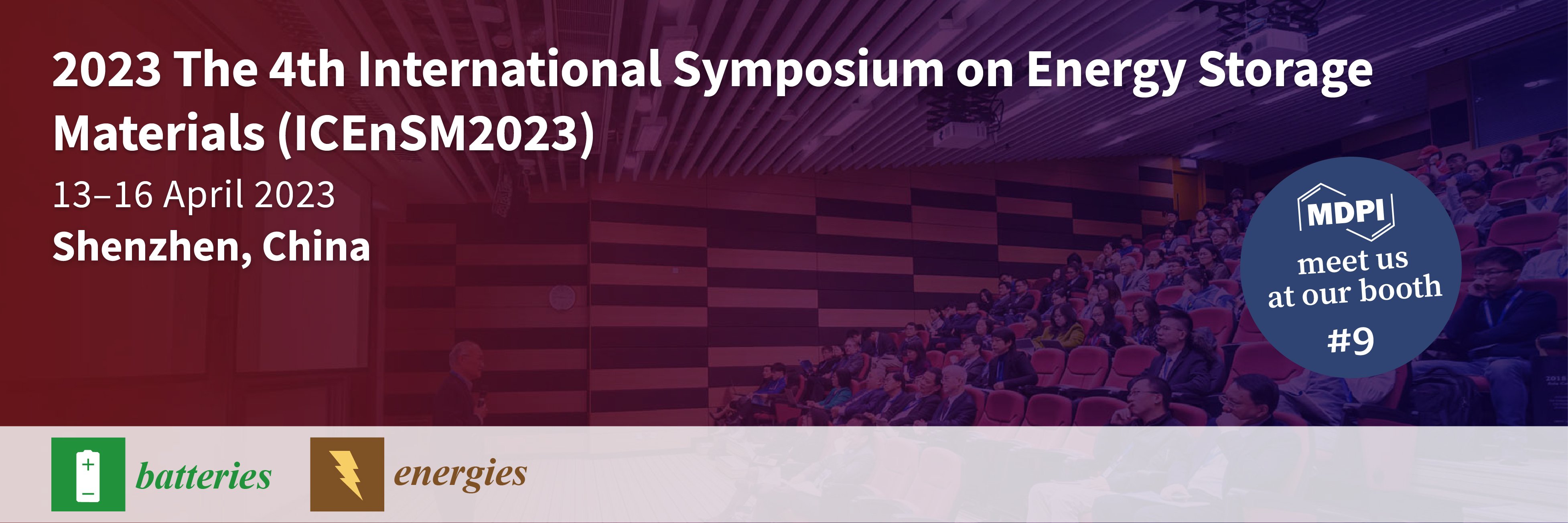
Conference: The Fourth International Conference on Energy Storage Materials
Date: 13–16 April 2023
MDPI will be attending the Fourth International Conference on Energy Storage Materials as the exhibitor. With the theme of advanced energy storage materials and energy storage devices, this seminar invites well-known scholars and industry professionals from around the world to discuss the latest research progress and industrial development status and trends in advanced energy storage materials and devices from academic and industrial perspectives in order to promote the application process of energy storage materials and energy storage devices. The conference is held annually.
The following MDPI journals will be represented:
- Batteries;
- Energies;
- Sustainability;
- Materials;
- Electronics;
- Nanomaterials;
- Inorganics;
- Crystals;
- AppliedChem;
- Membranes;
- Electrochem;
- Applied Sciences;
- Metals;
- Molecules.
If you are attending this conference, please feel free to start a conversation with us at our booth: #9. Our delegates look forward to meeting you in person and answering any questions that you may have. For more information about the conference, please visit http://www.icensm.ac.cn/eindex.html.
3 February 2023
Crystals | Selected Special Issue Reprints Published in 2021–2022
We are delighted to share with you 10 reprints of Special Issues published from 2021 to 2022 in Forests (ISSN: 1999-4907). They were selected by the Crystals Editorial Office, each with 10 or more articles published. You can read more reprints of Special Issues published by Crystals here. If you are interested in editing a Special Issue, you are welcome to apply here.
|
|
“σ- and π-Hole Interactions” |
|
|
“Advances in Industrial Crystallization” |
|
|
“Properties of Transition Metals and Their Compounds at Extreme Conditions” |
|
|
“Non-covalent Interactions in Coordination and Organometallic Chemistry” |
|
|
“New Trends in Lithium Niobate” Edited by Gábor Corradi and László Kovács ISBN 978-3-0365-3340-7 (Hbk); ISBN 978-3-0365-3339-1 (PDF) |
|
|
“Advances in Topological Materials” |
|
|
“Organic Conductors” |
|
|
“Crystallographic Studies of Enzymes (Volume II)” |
|
|
“Mineralogical Crystallography Volume II” |
|
|
“State-of-the-Art Liquid Crystals Research in UK” |
2 February 2023
Crystals 2022 Best Cover Award
To reward the authors who have published important research results in Crystals, we are announcing the Crystals 2022 Best Cover Award. There will be one cover story published in 2022 because of the writers' growing interest in having their studies published as a cover story in Crystals (ISSN: 2073-4352). This cover story provides key scientific findings or novel approaches along with striking imagery.
One Crystals 2022 Best Cover Award cover story will be chosen from the 12 stories published in 2022, and the winner will receive CHF 500. The criteria that will be considered for selection are as follows:
- The importance or innovation of the research;
- The quality of the cover image.
We will invite authors from these Issues to vote for the best cover and randomly select the votes of 10 participants, and then, to show our appreciation for their involvement in the voting process, the 10 selected participants will each receive a CHF 50 voucher. The vote will be open from 6 February 2023 to 6 March 2023.
Please cast your vote here: https://www.surveymonkey.com/r/M92ZML3.
The winners will be announced on the journal website at the end of March 2023.
Crystals Editorial Office
28 December 2022
Prof. Shujun Zhang Appointed Section Editor-in-Chief of Section “Polycrystalline Ceramics” in Crystals
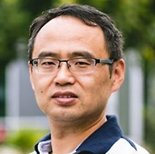
Prof. Shujun Zhang is a Distinguished Professor at the Institute for Superconducting and Electronic Materials, Australian Institute for Innovative Materials, University of Wollongong, Australia. Prior to this, he was a Professor at the Materials Science and Engineering Department and Senior Scientist at the Materials Research Institute of the Pennsylvania State University, USA. He is the IEEE fellow of UFFC-S (2021), a Fellow of the American Ceramic Society (2019), and a Future Fellow of the Australian Research Council (2015-2019). He delivered more than 130 invited/keynote/plenary presentations at international conferences, industries, and universities. He holds 11 US patents and has co-authored 580 papers in peer-reviewed journals. He is now focusing on the fabrication–microstructure–property–application relationship of electronic materials used for piezoelectric sensors, acoustic transducers, and energy storage/harvesting applications.
The following is a short Q&A with Prof. Shujun Zhang, who shared his vision for the journal with us, as well as his views of the research area and Open Access publishing:
1. What appealed to you about the journal that made you want to take on the role of its Section Editor-in-Chief?
I have been involved in the journal Crystals since 2014. I have been Section Editor-in-Chief for the Sections “Crystal Engineering” (2017-2018), “Crystalline Materials” (2018-2019), and “Inorganic Crystalline Materials” (2019-2022), and now I’m glad to serve as Section Editor-in-Chief for the newly launched “Polycrystalline Ceramics”, which is an important research direction in the field of Crystals. This will give me an opportunity to ensure the quality of articles and contribute to the success of the journal.
2. What is your vision for the Section?
The Section aims to attract papers in all aspects of polycrystalline ceramics, including ceramic processing and manufacturing, functional ceramics, engineering ceramics, structural ceramics, ceramic composites, microstructure characterization of ceramics, thermodynamic and kinetic studies of ceramics, reliability and stability of ceramics, and ceramic applications, etc. This Section will become a forum for discussing the current state-of-the-art and recent advances in ceramic exploration.
3. What does the future of this field of research look like?
We have a promising future in this research field since ceramics have been studied extensively for numerous applications, for meeting the current demand and fueling the transition to renewable energy, advanced technology, health, communication, and infrastructure. I would certainly like to see submissions to Crystals that are closely related to this type of expected outcome.
4. What do you think of the development of Open Access in the publishing field?
I believe that the Open Access model is a good way to ensure that quality research is quickly and broadly exposed to academia and industry alike, making new research results freely available online to an unlimited audience, thus creating an invaluable approach for research.
We warmly welcome Prof. Shujun Zhang as the new Section Editor-in-Chief and we look forward to him leading Crystals to reach many more milestones.
22 December 2022
Special Issue Mentor Program
We are pleased to announce the launch of a new initiative—the MDPI Special Issue Mentor Program.
This program will enable early career researchers (who must hold a Ph.D. in a related field) to experience editing a Special Issue in MDPI journals, under the mentorship of our experienced Editorial Board Members or other experienced scientists. The mentor program will provide an excellent opportunity for early career scientists to gain editorial experience, and to cultivate their ability to edit scientific research.
The mentee’s responsibilities include:
- Proposing a Special Issue title and assisting the mentor in preparing a summary (around 200–400 words) and 3–10 keywords describing the background, importance, and goal of the Issue;
- Writing a brief promotion plan for the Special Issue;
- Preparing a list of scholars who may be interested in the Issue and personally e-mailing invitations on behalf of Guest Editors;
- Writing an editorial for the online Special Issue together with the mentor.
The mentor’s responsibilities include:
- Conducting a final check before the Special Issue is published online;
- Performing editorial control of the Special Issue and quality control of the publications, both of which must be carried out in a timely manner;
- Providing suggestions to younger scholars if they have any doubts or concerns regarding submissions;
- Organizing video calls with young scholars and the Editorial Office regularly to discuss problems and improvement suggestions for the Special Issue;
- Making and submitting decisions regarding submissions with the assistance of mentees.
Certificates and awards:
After the Special Issue closes, the Editorial Office will provide official certificates for all the mentors and early career researchers.
If you are interested in this opportunity, please send your Special Issue proposal to the Editorial Office of a journal you choose, and we will discuss the process (i.e., mentor collaboration, Special Issue topic feasibility analysis, etc.) in further detail. The full list of MDPI journals is as follows: https://www.mdpi.com/about/journals.
In addition to the new Special Issue Mentor Program, we will continue to welcome all Special Issue proposals focusing on hot research topics.
14 December 2022
"Thanks a Million!" – One Million Articles Published in MDPI Journals
MDPI has just become the first open access (OA) publisher to reach the milestone of one million articles published. That is one million articles freely available to all, to circulate and build upon! We are proud to share this special moment with the global scientific community.
This landmark has been reached thanks to the immeasurable support of more than 600,000 expert reviewers, 66,000 editorial board members and 6700 hard-working colleagues across MDPI’s global offices.
Within more than 25 years of publishing, our journals received 2.1 million manuscripts and generated 4.6 million peer review reports to get to one million papers published.
Reaching the milestone of one million articles published reinforces our mission to remove any existing barriers and to make scientific research accessible to all. Since its inception, MDPI’s goal has been to create reliable processes to make science open. This is a path towards facilitating the dissemination of novel insights in scientific communities.
Regular feedback from authors and reviewers shows that our service is greatly appreciated and needed. At the same time, the feedback helps us identify areas for further improvement.
As it stands, a significant share of published research findings remain closed access. More than half of the content published with the most well-known legacy publishers stays behind a paywall, and that is not including articles published in hybrid OA journals, or made available months or years after publication.
A new policy announced by the US administration in August 2022 requires that, as of January 2026, all US federally funded research be made freely and immediately available after publication. While the new policy does not mandate articles be published under an open access license, it is aligned with the open access movement in removing all barriers to research. Similarly, some of the most advanced research institutions in the world intend to have all funded research articles published in open access by 2025.
MDPI is proud to be the leading agent of the transition to open access.
"Thanks a Million" to all the contributors!
12 December 2022
Editorial Board Members from Crystals Featured in the 2022 Highly Cited Researchers List Published by Clarivate
Recently, ClarivateTM revealed its 2022 list of Highly Cited ResearchersTM—individuals at universities, research institutes and commercial organizations.
The scientists who were selected into this year’s list of Highly Cited Researchers have published highly cited papers in the 11-year period from January 2011 to December 2021, with a citation frequency in the top 1% of academic subjects and the same year of publication in the Web of ScienceTM database. Based on the Web of Science Citation data, 6,938 researchers from across the globe who have demonstrated a disproportionate level of significant and broad influence in their chosen field or fields over the last decade have been awarded Highly Cited Researcher 2022 designations. The list is truly global, spanning 69 countries or regions and spread across a diverse range of research sciences and social sciences.
According to statistics, 9 members of the Editorial Board of Crystals (ISSN: 2073-4352) have been selected into the list of Highly Cited Researchers of Clarivate in 2022. They are being recognized for their high-quality scientific research achievements and outstanding contributions to professional fields. The Crystals journal office sincerely congratulates all elected Editorial Board Members and hopes that they continue to have an academically productive relationship with the journal.
|
Name |
Affiliation |
|
Prof. Dr. Yang Bai |
Chinese Academy of Sciences, China |
|
Prof. Dr. Bo Chen |
City University of Hong Kong, Hong Kong |
|
Prof. Dr. Jin-Wook Lee |
Sungkyunkwan University (SKKU), South Korea |
|
Prof. Dr. Neng Li |
Wuhan University of Technology, China |
|
Prof. Dr. Artem R. Oganov |
Moscow Institute of Physics & Technology, Russia |
|
Prof. Dr. Sibo Wang |
Fuzhou University, China |
|
Prof. Dr. Xiaofei Yang |
Nanjing Forestry University, China |
|
Prof. Dr. Zongyou Yin |
Australian National University, Australia |
|
Prof. Dr. Faxing Wang |
Dresden University of Technology, Germany |
8 December 2022
MDPI Sustainability Foundation: New Look and Nominations for the 2023 Sustainability Awards Now Open

We are pleased to announce that the website of the MDPI Sustainability Foundation has been revamped! For the past couple of months, our UX UI team and front-end developers have been working hard to launch the website in time for the opening of the Sustainability Awards nominations.
The website is not the only thing that has had a remodeling. Indeed, the format of the Emerging Sustainability Leader Award (ESLA) has been updated. ESLA is now a competition open to individual researchers or start-ups founded by researchers under the age of 35. Nominee applications will go through 2 rounds of selection until the final 3 are decided. The finalists will then be invited to give pitch presentations during the Award Ceremony to win either first place (10,000 USD) or runner-up (2 x 5000 USD).
The World Sustainability Award, on the other hand, remains the same: a total prize money of 100,000 USD is up for grabs by senior individual researchers or groups of researchers from the international research community.
Nominations for both the World Sustainability Award and the Emerging Sustainability Leader award are now open! Check out our new website for more information on how to nominate.



